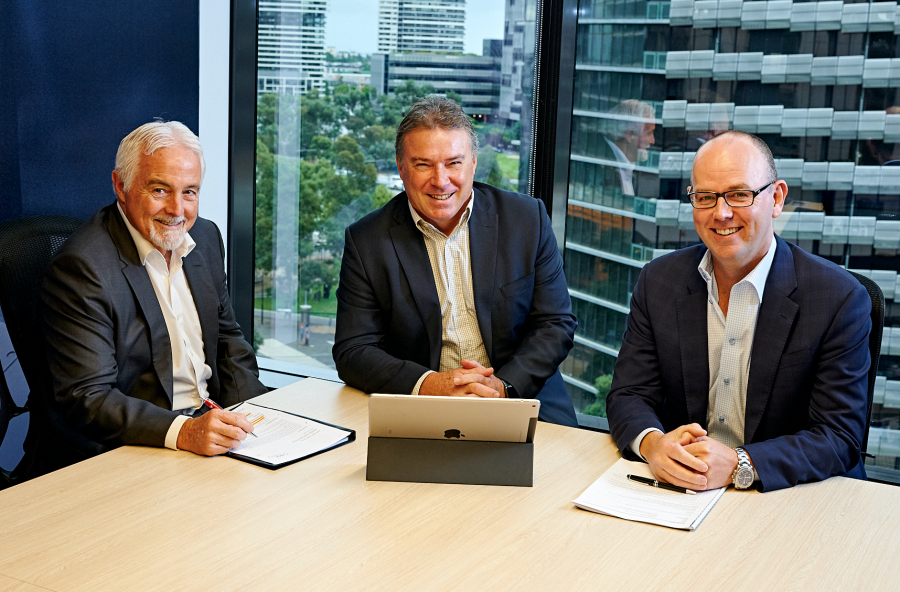In the second part of their extended discussion with BioPharmaDispatch, the three leaders of Australia's pharmaceutical wholesale sector talk about their industry, its ambitions and hopes for the current negotiation with the federal government.
The National Pharmaceutical Services Association (NPSA) represents the full-line PBS wholesalers who also qualify for payments under the federal government's Community Service Obligation.
Sigma CEO Mark Hooper is the NPSA chair and he was joined in the discussion by the CEOs of API and Symbion, Richard Vincent and Brett Barons.
The NPSA is currently engaged in negotiations over their future remuneration. Historically, their remuneration has been included as part of the Community Pharmacy Agreement (CPA).
The negotiations remain confidential. However, the NPSA has taken a very different approach compared to previous CPA negotiations. In 2015, where annual indexation of the PBS Community Service Obligation was removed under the finalised 6CPA, the NPSA ceded its negotiating authority to the Pharmacy Guild.
In 2020, as discussions between the Guild and federal government appear stalled, the NPSA is negotiating on its own behalf.
"In the simplest terms, we have just tried to take control of our own destiny. It is not a case of being aligned with other stakeholders, or not, it is just about taking control of what happens to our sector," said Mr Hooper.
"It has been a conscious strategy to say ok, we still want to work collaboratively with other stakeholders, but at the end of the day, we need to have an independent voice in this process.
"In the end, we are less than six per cent of the overall PBS spend, but we also invest in and maintain a network that is part of Australia's critical health infrastructure.
"The engagement we have had with the Minister's office and with the Department of Health has been pretty productive. It has been a good ongoing exchange and we would expect that to continue."
According to Mr Vincent, 'There is the manufacturer and the pharmacist but the system does not hang together without wholesalers in the middle. You cannot blame anyone else if people do not understand what you do, which speaks to that more proactive approach we have taken.
"If there is no great appreciation for what we do, then we need to step forward and make the case. We need to invite people to take a look at the investment in the automation of distribution centres because you cannot appreciate it, and what it means for the efficiency of medicines delivery if you never see it. The responsibility for that sits with us."
Mr Barons said, "At the end of the 6CPA, it is clear that we have had a phenomenal and real funding decrease. We clearly were not in front of mind when it was negotiated in 2015. Frankly, it would have been irresponsible for us to have just said we should go with the same approach we did then.
He added, "The language is different, the engagement from our end has been deliberately different, and the response has been positive. We are having our own conversation and that has only been positive."
Mr Hooper continued, "If the system breaks you are not going to be able to rebuild it - it breaks permanently. That is the challenge. It has been up to us to be more proactive in taking the time and making the effort and we have. We have committed to speaking to a range of stakeholders to help them understand what we do and why we do it."
Mr Barons was reluctant to make predictions about the outcome of their negotiations but he said they are hoping for some form of agreement, "whether that is part of the 7CPA or something else, that fairly recognises the value we provide for Australian patients and gives us a sustainable platform to continue to reinvest."
On the review of National Medicines Policy, Mr Hooper said the principles are clear and enduring. "The issue for consideration is how they are applied and practised. We have an evolving landscape in terms of the types of medicines that are looking to be funded so how will those principles be applied.
"I also struggle with this concept on the budgetary constraint that seems to have become the accepted norm - that is, you cannot fund a new medicine unless somehow you are saving money somewhere else.
"The proportion of new medicines that require 'high care' complex handling, such as cold-chain, has grown and is growing. There is a role for us but I also think 'brand pharma' companies need to explain what is actually happening. The minister is listing these new therapies - he seems to have a good sense of it - but it is important for everyone to understand what that looks like in ten years and what the system need to do in order to accommodate that."
View the first part of the interview here.

